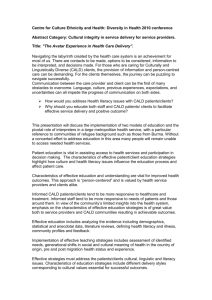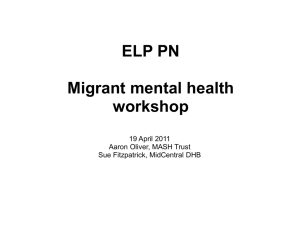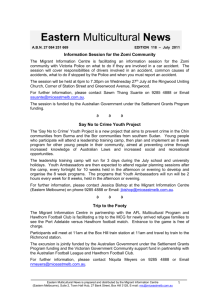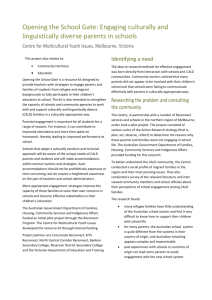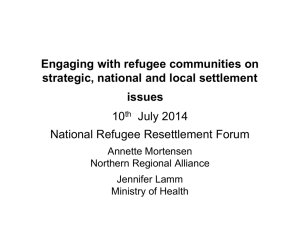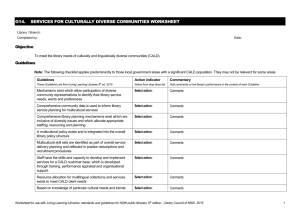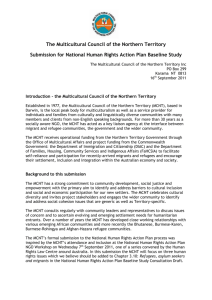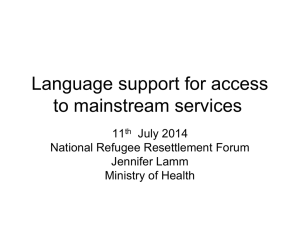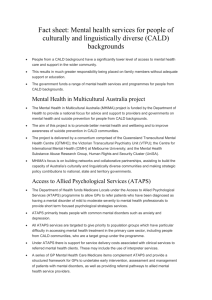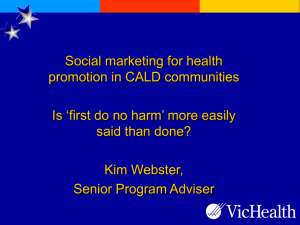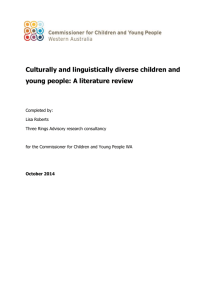Ochre report template A
advertisement
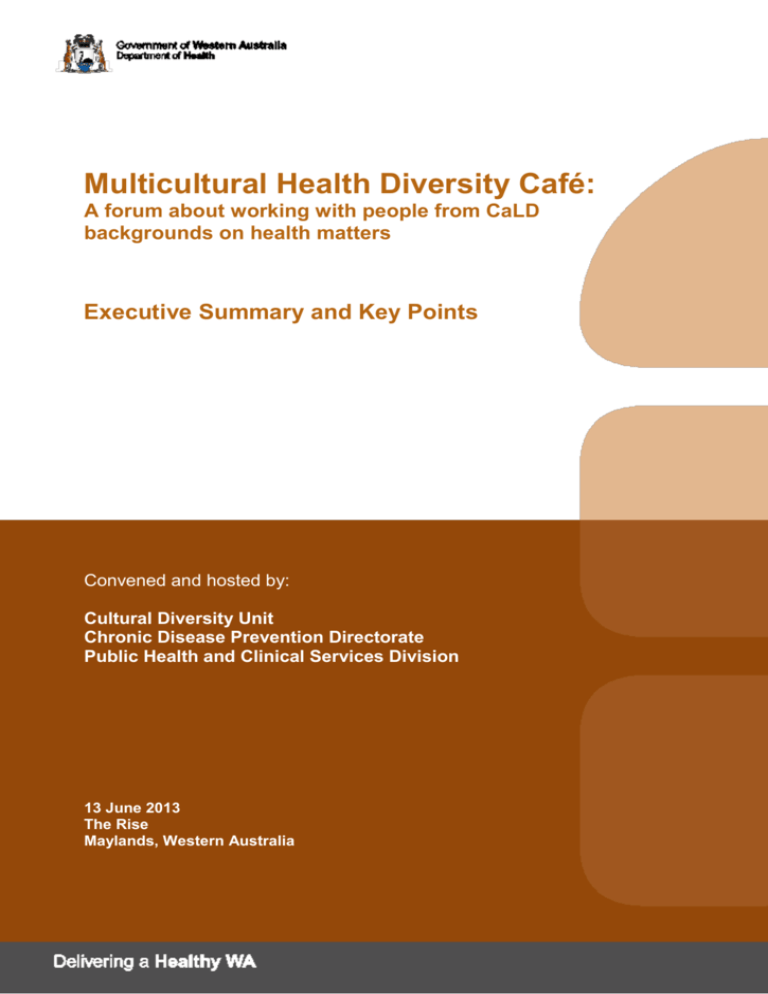
Multicultural Health Diversity Café: A forum about working with people from CaLD backgrounds on health matters Executive Summary and Key Points Convened and hosted by: Cultural Diversity Unit Chronic Disease Prevention Directorate Public Health and Clinical Services Division 13 June 2013 The Rise Maylands, Western Australia Executive Summary The inaugural Multicultural Health Diversity Café: a forum about working with people from culturally and linguistically diverse backgrounds (CaLD) on health matters was held on 13 June 2013 at The Rise in Maylands, Western Australia. It was convened and hosted by the Cultural Diversity Unit located within the Chronic Disease Prevention Directorate (CDPD), Public Health and Clinical Services Division, Department of Health. The Diversity Café brought together service providers to share, discuss, listen, ask and showcase current work with consumers and carers from CaLD. It sought to provide another learning opportunity for service providers on the ongoing journey to develop cultural competency for the provision of equitable access and safe and high quality health programs and services. A total of 75 service providers from WA Health, government agencies, nongovernment organisations and community services attended and actively shared their experiences, the challenges faced when providing services to CaLD communities and opportunities to link to improve health service provision. There were four insightful presentations on: ‘Working with Refugees’ by Dr Aesen Thambiran, Medical Director of the Humanitarian Entrants Health Service, North Metropolitan Health Service. Delivering Diversity – The Multicultural Sexual Health Project by Sean Brennan, Benny Sullivan, Senior Policy Officers of the Sexual Health and Blood Borne Virus Program (SHBBVP) and Anne Sorenson, Sharing Stories Project Coordinator of the Metropolitan Migrant Resource Centre. Ageing at the Diversity Café by Amar Varsani, Multicultural Aged Care Service Coordinator, Multicultural Aged Care Service, Independent Living Centre (ILC MAC). Women’s Health by Ruth Sims, Senior Social Worker and Project Coordinator, ISHAR Multicultural Women’s Health Centre who was proxy for Andrea Creado, Chief Executive Officer, ISHAR. CDPD Director Denise Sullivan opened the Café with an acknowledgement of country and welcomed all participants. She emphasised the importance of addressing the health care needs of people from CaLD backgrounds in accordance with WA Health’s Strategic Intent and the need to raise the profile of multicultural health. She also thanked Ruth Lopez and Kelli Monaghan for organising the first Multicultural Health Diversity Café. 9 Dr Aesen Thambiran, in his presentation about refugee health, described why refugees are different. They often come from situations of conflict, under-nutrition and food insecurity, may have experienced torture and trauma and may have acquired communicable diseases such as TB, HIV, syphilis and helminths. He spoke about post arrival screening recommended by various health bodies including the Royal Australian College of General Practitioners (RACGP) and which the Humanitarian Entrants Health Service (HEHS) provides for all refugees settling in Western Australia on a free and voluntary basis. He highlighted that HEHS assessments, a comprehensive process involving medical, social, obstetric and immunisation history taking, blood screening and oral examinations, and treatment, immunisation and management plans are all done with the help of an onsite interpreter. He also spoke about additional post migration stressors that need to be considered by service providers such as rent, language, lack of income, navigating the health system, getting the kids to school, food, lack of social supports, grief and financial stress due to families being left behind. Talking about what works in refugee health service provision, Dr Thambiran emphasised that his tips were more experience based and not necessarily evidence based. These included: Acknowledging that we are all cultural beings (and a little ethnocentric), trying not to act in a way which is culturally unsafe, communicating effectively by engaging interpreters when needed, asking the right questions such as ‘Who are you and where are you from?’ Additional practical tips include booking longer appointments, explaining the purpose of your service, emphasising confidentiality, checking client’s age (as the date of birth on the visa might be wrong) and being aware of different communication styles and flexibility. Sean Brennan and Benny Sullivan cited that SHBBVP initiated the Multicultural Sexual Health Project in 2010 in response to demographic shifts which saw increasing numbers of people from other countries with HIV and BBVs in WA. These changes pointed to a need for strategies to increase community knowledge about sexually transmitted diseases, prevention, protection and help seeking behaviours. Their program then identified that one key was to develop a workforce that is culturally competent in working with people from CaLD backgrounds. They were guided by a data driven approach which found that there is excellent data on HIV rates and Hepatitis B but limited on the prevalence of STIs in CaLD communities in Australia. And coupled this with a partnership approach which led them to consult with community, NGO and government stakeholders and develop a strong partnership with the Metropolitan Migrant Resource Centre through a project they funded called “Sharing Stories.” Anne Sorenson got everyone moving as she described theatre based sexual health education by asking groups to depict images for diversity, loving relationships and sexual health education. She proceeded to share the outcomes of the project using three main work areas: peer education, community education and sector development. She shared that over 900 youth have been reached though 65 activities such as performances (After School I’ll Marry You, Miss Understood and The Boat) and small group sessions. Eight CaLD peer mentors have been trained and 4 peer mentor camps have been held. In community education, Anne highlighted that 400 parents have been reached through various activities such as the HIV community education training for community members, World Aids Day events for CaLD communities and Women’s Drama group. Anne also talked about sector development which she contributed to via 9 presentations at FPWA sexual health forums and has conducted training using theatre for social change and translation support. Amar Varsani invited Café participants to join her on the ageing journey which she said everyone was already on anyway. She cited the 1997 Aged Care Act, the 1997 Partners in culturally appropriate care initiative by the Commonwealth Government and the 1998 Charter of public service in culturally diverse society as foundations for the provision of health care for CaLD aged. Statistics and tables pertaining to 65+ years old CaLD people in WA were then showed, with the top five birth countries being the UK, Italy, Netherlands, India and New Zealand and the top five languages other than English spoken at home being Chinese, Italian, Vietnamese, Arabic and Indonesian. Amar also spoke about the growing and emerging ageing communities from the Philippines, Indonesia, Burma, Sri Lanka and Japan. She highlighted the need for more cultural awareness and culturally appropriate aged care services to respond to the growing diversity in the aged population where, by 2026, one in five people over 80 years old will be from a CaLD background. Amar talked about ILC MAC services and their work connecting agencies like DoHA, aged care services providers, ethno specific providers and CaLD communities; information services; and training and education (with CaLD specialist courses focused on assisting elderly with torture and trauma experiences, palliative care, continence care and dementia). She mentioned available resources such as the ethno-specific multicultural aged care handbook with over 26 cultural profiles and communication aids such as cue cards and translated materials. Ruth Sims spoke about migrant and refugee women’s health from the heart by sharing her own experiences of migration to Australia and highlighting the opportunities and challenges of settling in a new country. People from refugee background are working diligently to contribute to the development of Australia as they engage in work related endeavours and pursue higher education. Ruth encouraged Diversity Café participants to be mindful when using the word “refugee” when referring to women (and men) from refugee backgrounds as they cease to be refugees when they get to Australia. She indicated that “women from refugee backgrounds” are working relentlessly to become part of Australian society and each time they are identified as refugees, it makes them feel like they are still vulnerable to stigma and discrimination. Ruth then spoke about the various programs, including the health clinic and other health and social services that ISHAR offers to women from all backgrounds. Ruth Lopez who was the facilitator for the Café gave instructions about the buzzing sessions that followed each presentation and called attention to the guide questions which were drawn from the presentation topics. From the buzzing sessions, each group was asked to come up with three key points to post on the Diversity Café Summary Wall. 9 Key Points from the Diversity Café Summary Wall 1. Why is there a need to cater to health care needs of migrants and refugees? the right to health and health care is a basic human right there is a need to consider health holistically substantive equality issue equality – access and equity access and equity is a reciprocal process right to have good health, rights to access the means to good health, obligation to provide the means to good health accessing health services fear of stigma – as a barrier to identifying and addressing problems (sexual health, drug use as examples) migrants and refugees need help assimilating so they can move forward addressing isolation/social support because it helps everyone. What are the challenges to you who work in health care, health promotion, community health and other health related areas? Your agencies or organisations? political agenda policy change – affecting policy change and service knowing what to raise when collecting good data to inform service planning and reporting funding that fit the needs of individuals health care costs and perceptions of costs lack of time, resources and funding need to communicate effectively lack of interpreter use lack of quality and training of interpreters challenge of interpreting and providing training mental health issues faced by refugees including stigma attached to being a refugee community education and information different perceptions of what is ‘healthy’ transport - how to get there and navigating the public transport system longer appointments – Medicare rebates. Challenges for agencies: meeting diverse needs within minimal budgets time and appropriate resources required to develop service access difficulty navigating a complex health system, both by the service provider and the consumers/patients 9 need to understand the health system difficulty engaging with communities communicating with CaLD communities adapting universal programs to diverse cultures and identifying target ethnic groups self awareness duty of care – standard of care where do people access services – need for quality services to refer people to knowing where to start, what services to tap into and how to connect with CaLD consumer groups in local service area for consultation and needs analysis CaLD consumers will not access services if not culturally appropriate (fall through the gap). 2. How can we work effectively with young people from CaLD backgrounds on sensitive health issues (think STIs, depression, etc)? start with the basics, especially within culturally sensitive groups ‘normalising’ so sexual health is not seen as taboo be sensitive around taboo topics respect cultural ideas share and don’t ‘instruct’ contextualise take time to develop rapport and trust in a safe environment identify barriers and how to work with these barriers implement school programs where you can have captive audience provide channels for prevention and intervention outreach with culturally appropriate services reinforce that privacy and confidentially will be maintained listen and understand where young people come from build strong relationships with young people empower young people to be involved in the process create a safe space for youth to speak up about taboo and/or contentious topics not often brought up make it fun and interactive in a format that appeals to youth employing bilingual youth health workers use ‘youth’ language engage interpreters and translate information provide information to family and not just the young person to ensure that everyone gets the same message consult youth in communities work with parents and educate on sexual health so they can provide support and understand get elders/leaders involved work with communities, elders, parents/guardians to get to the youth develop youth (peers) champions to talk to their own communities train youth leaders to talk to other youth build old/young people relationships 9 use persistent and consistent open communication using different and engaging strategies be flexible be ‘opportunistic.’ 3. What are the issues faced by our older people in general today? What are the additional issues faced by older people from migrant and refugee backgrounds? language issues such as loss of English proficiency which could lead to isolation and difficulty communicating with family language barriers to care such as non use of interpreters by health professionals which could lead to medicine overdose isolation arising from loss of family and social support and family breakdown inability to access medicine and traditional food difficulties in juggling work and providing care cost of living affects family traditions of caring for elders transport affordable housing mental health issues such as anxiety, depression, war related post traumatic stress disorder (PTSD), trauma and grief and loss access to facilities discrimination lack of capability (including financial) to go home to country of origin navigating the system to find appropriate services loss of independence and becoming dependent on others difficulty in using technology lack of empowerment, helplessness intergenerational gap between parents and children cultural gap between parents and children culture conflict roles cultural divide religious and cultural differences ageing in a different culture safety complex health issues burden health services. What are effective ways of addressing these issues? work on improvements to our public health system linking to and with services identify service demands and set priorities prevent isolation both emotionally and clinically acknowledge individuals within a culture 9 educate and empower the aged on the use of technology particularly for communication purposes utilize various ways of communicating with the aged by using memory aids, photos on display, story telling and iPad for translations maximize the opportunity afforded by huge numbers of CaLD staff in aged care facilities create legitimate and meaningful career pathways for the many CaLD people working in aged care promote a bilingual/multicultural workforce conduct workforce training and planning including general staff education regarding CaLD issues (including those that arise prior to entering Australia) and knowledge of support services promote positive ageing promote the availability of CaLD aged care and related services provide cultural education and information (including about the seniors card) to families and customers in a timely fashion via community groups and local shire encourage intergenerational sharing of stories by older people to younger people (this could happen in classrooms). 4. What are the five key health issues faced by women from CaLD backgrounds? health literacy, for example, women not knowing how the body works navigating the health system culturally inappropriate service provision, for example, General Practices dominated by male doctors not providing interpreters during labour or throughout pregnancy mental health issues arising from lack of housing, settling in a new environment, intergenerational conflict finding appropriate support and agencies lack of information on available resources/services access and equity issues due to language barriers, visa status, transport and cultural and religious barriers lack of access to social activities problems with integration/assimilation some people generally pre-judge and make assumptions and have no respect for who they are acceptance inter-generational conflict domestic violence financial constraints underemployed gender role changes when women find work first before the males in the family women have increased responsibilities as they find jobs and balance this with family support social isolation for women who are left at home with children and lack of support network abandonment low confidence and self esteem 9 stigma trust and confidence in service providers language barriers. How can your work and your agency’s work address the health needs of migrant and refugee women? engage bi-cultural workers refer to culturally-aware agencies when making referrals, make sure the service providers use interpreters link with services and make introductions conduct follow up and check up calls advertising and promote your services for migrant and refugee women provide point of entry contact offer education and information sessions to women (including about their rights) provide community health programs conduct health education organise social support groups provide physical education programs empower women through training and workshops, education and information and counselling food security ask women what they need/ Consult with women employ female doctors with language skills be flexible investigate existing effective strategies and link with others, when appropriate lobby for funding ensure mothers get relevant income/subsidies, separate from the husbands’ accommodation security provide assistance in securing driver’s license, including the accompanying costs don’t make judgments and assumptions and don’t use labels gain cultural understanding become cultural and gender sensitive. 9 Diversity Café participants: The Diversity Café was attended by 75 participants from various government and nongovernment organisations. Mentioned below are those who gave permission for their names and contact details to be included in the report. Last name First name Agency/Program Email Abraham Jillian Chronic Disease Prevention Directorate Department of Health Jillian.Abraham@health.wa.gov.au Baker Julie Child and Adolescent Community Health julie.baker@health.wa.gov.au Brennan Sean Sexual Health and Blood Borne Virus Program Sean.brennan@health.wa.gov.au Burns Jonelle Department of Sport and Recreation jonelle.burns@dsr.wa.gov.au Carrington Nigel Child & Adolescent Community Health Nigel.Carrington@health.wa.gov.au Carter Shannon Geographic Information Systems Unit Department of Health Shannon.carter@health.wa.gov.au Chambers Fiona Chief Health Professions Office Department of Health fiona.chambers@health.wa.gov.au Chee Eugene Child and Adolescent Health Service Eugene.chee@health.wa.gov.au D’Adamo Rosita Hepatitis WA vivb@hepatitiswa.com.au Dzvangah Celeste Metropolitan Migrant Resource Centre Inc celeste.dzvangah@mmrcwa.org.au Fagan Joanna Humanitarian Entrants Health Service North Metropolitan Health Service Joanna.fagan@health.wa.gov.au Glick Martin Dental Health Services Martin.Glick@health.wa.gov.au Graham Monica Bethanie Aged Care facility monica.graham@bethanie.com.au Jamieson Heather Princess Margaret Hospital Heather.Jamieson@health.wa.gov.au Kaplanian Carol FGM and African Wellness Program Women’s and Newborn’s Health Service Carol.kaplanian@health.wa.gov.au Lopez Ruth Cultural Diversity Unit Department of Health Ruth.lopez@health.wa.gov.au Lynes Helen Perth Central and East Metro Medicare Local helen.lynes@pcemml.org.au Martin Tracy Nursing and Midwifery Office Department of Health tracy.martin@health.wa.gov.au 9 Monaghan Kelli Cultural Diversity Unit Department of Health Kelli.Monaghan@health.wa.gov.au Moody Martin Child and Adolescent Health Service martin.moody@health.wa.gov.au O'Connor Kathleen WA Cancer & Palliative Care Network Kath.OConnor@health.wa.gov.au Pala Amrik Health Consumers Council helloj@hotmail.com Parnell Yvonne North Metropolitan Health Service Governing Council yparnell@aqumen.net.au or northmetrogc@health.wa.gov.au Riddell Kate Office of Multicultural Interests Kate.Riddell@omi.wa.gov.au Scrutton Sue Donate Life Sue.scrutton@health.wa.gov.au Sims Ruth ISHAR Multicultural Women’s Health Centre pavetheway@ishar.org.au Smith Lyn Child and Adolescent Community Health Lyn.smith@health.wa.gov.au Sorenson Anne Metropolitan Migrant Resource Centre Anne.sorenson@mmrcwa.org.au Spadanuda Pat Carlisle Campus Polytechnic West patrizia.spadanuda@polytechnic.wa.edu.au Sterrett Robyn South Metropolitan Health Service Robyn.sterrett@health.wa.gov.au Sullivan Denise Chronic Disease Prevention Directorate Department of Health Denise.sullivan@health.wa.gov.au Sullivan Benny Sexual Health and Blood Borne Virus Program benny.sullivan@health.wa.gov.au Taylor Suzanne Perth South Coastal Medicare Local staylor@pscmi.com.au Thambiran Aesen Humanitarian Entrants Health Service North Metropolitan Health Service Aesen.thambiran@health.wa.gov.au Turner Peta Chronic Disease Prevention Directorate Department of Health Peta.turner@health.wa.go.au Varsani Amar Multicultural Aged Care Service Independent Living Centre Amar.Varsani@ilc.com.au Vile Lisa Fremantle Hospital & Health Service lisa.vile@health.wa.gov.au Warburton Jo-Anne Metro East Commonwealth Carelink and Respite Centre jawarburton@redcross.org.au Wood Kat Adult Migrant English Program Kat.wood@polytechnic.wa.edu.au Furneyvall Sonya Injury Control Council WA sfurneyvall@iccwa.org.au Roberts Megan Metropolitan Migrant Resource Centre Megan.roberts@mmrcwa.org.au Robinson Lesley South Metropolitan Health Service Lesley.Robinson@health.wa.gov.au 9 This document can be made available in alternative formats on request for a person with a disability. © Department of Health 2013
